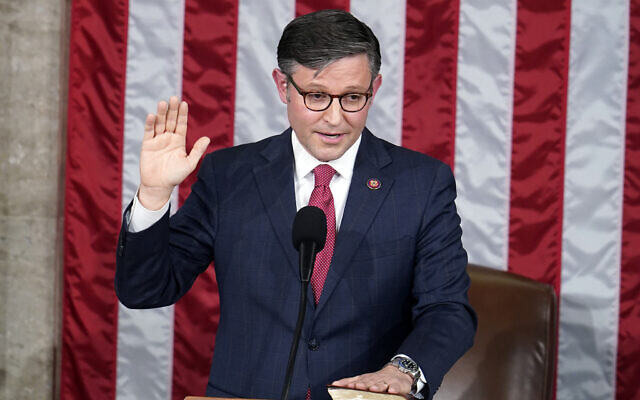The Johnson Revolution: GOP Finds Its Voice and Unity
In a House chamber steeped in political turmoil, Republicans made a decisive and unexpected move to restore order, electing Rep. Mike Johnson of Louisiana as the 56th Speaker of the House. The gravity of this choice reverberates beyond the halls of Congress, echoing the party’s resounding shift toward its conservative roots. Johnson’s ascent to the Speaker’s chair, ending a tumultuous three-week ordeal, signifies a notable moment in the GOP’s history.
Throughout the past several weeks, the GOP had found itself ensnared in a bewildering succession battle, leading to the shocking ouster of Speaker Kevin McCarthy. Such a state of disarray led to governmental paralysis, jeopardizing vital legislation on the horizon, including emergency aid packages for U.S. allies, Ukraine and Israel, and averting a looming government shutdown.
Johnson’s nomination marks a departure from tradition, as his was the fourth name to emerge in this seemingly endless cycle of political infighting. Not the party’s primary choice, Johnson nevertheless emerged as a significant figure in Republican leadership, a recognition of his unwavering conservatism and remarkable calm in the face of political tempests.
Former President Donald Trump lent his weighty endorsement to Johnson, declaring his confidence in the newly elected Speaker. This move, while unconventional, resonates profoundly in the realm of GOP politics. His affirmation and the resonance of Johnson’s nomination among fellow Republicans herald a crucial step in bridging the rift that threatened to devour the party’s cohesion.
The turmoil that has gripped Capitol Hill was not merely a spectacle; it was a reflection of the broader ideological war within the Republican Party. A faction of far-right members vehemently rejected the prospect of a more traditional Speaker, while moderate conservatives shunned the hardliners. Johnson, with his nuanced approach and deep religiosity, bridged the gap.
The resilience of Speaker Mike Johnson lies in his ability to build alliances, even with those who might not fully embrace his brand of conservatism. He earned the endorsements of prominent figures such as Rep. Jim Jordan, the firebrand chairman of the Judiciary Committee, and Majority Leader Steve Scalise, both of whom represent vital constituencies within the party. Their support underscores the expectation that Johnson will offer a balanced perspective.
Johnson’s position at the helm arrives at a critical juncture. With a slim 221-212 majority in the House, he can ill afford any discord within his own party. Immediate challenges await him, including a pending government shutdown, funding for emergency aid, and crucial decisions on a budget deal that divides the party. The far-right’s quest for steeper budget cuts could test Johnson’s ability to unify his caucus, given his prior support for the budget agreement brokered by McCarthy and President Joe Biden.
The tenure of the most recent House Speakers has been anything but conventional. Johnson’s predecessors grappled with similar crises, and with their departures, the path forward remained uncertain. Yet the GOP’s choice to embrace Speaker Mike Johnson conveys a sense of unity, an endeavor to turn the page on their recent upheaval.
Johnson’s faith and firm convictions have appealed to many, and in a moment that saw democracy play out with all its messiness, the GOP found itself an unlikely, unifying figure in a time of perplexity.
As Speaker Mike Johnson said after securing the nomination, “Democracy is messy sometimes, but it is our system. We’re going to restore your trust in what we do here.” In an era of discord, these words resonate as a call for unity and a desire to deliver the promises of governance.
